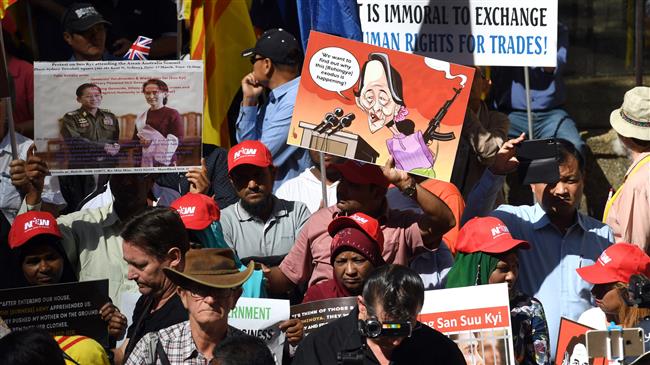Myanmar’s Suu Kyi greeted by protesters in Sydney over Rohingya crisis


Myanmar’s de facto leader Aung San Suu Kyi has been greeted by street protests in Australia over her response to the Southeast Asian country’s ongoing violent campaign against persecuted Rohingya Muslims.
The protests were attended by Rohingya supporters and human rights activists who chanted “Go Home Aung San Suu Kyi” and were held as Suu Kyi arrived in Australia’s most populous city, Sydney, for a summit of Southeast Asian leaders over the weekend.
Suu Kyi has been under fire internationally for her public silence about a military crackdown against the Rohingya in Myanmar’s Rakhine state. A Nobel Prize winner, Suu Kyi has seen several international honors she was given in the past revoked. Several fellow Peace Prize winners have also publicly condemned her.
Suu Kyi has done virtually nothing to stop the crimes committed by the military against the Rohingya.
Suu Kyi’s government has also snubbed and obstructed UN officials who have sought to investigate the situation and it has prevented aid agencies from delivering food, water and medicines to the refugees.
During her Australian visit, Suu Kyi also held talks with Prime Minister Malcolm Turnbull in Canberra. There was no press conference with Turnbull or any public comment from Suu Kyi during her brief visit to the Australian capital on Monday.

However, Suu Kyi on Monday pulled out of a public speech and question-and-answer session in Sydney because she was “not feeling well.” She had been due to make a speech at the Lowy Institute think-tank in Sydney on Tuesday.
“This afternoon the Lowy Institute was informed by the Myanmar embassy that the State Counsellor will no longer be able to participate in this event as she is not feeling well,” a spokeswoman for the think-tank said in a statement.
“Accordingly, the event is now canceled.”
The speech and subsequent Q and A session would have been the only public comments Suu Kyi would have made during her Australia trip.

Since late 2016, Myanmar’s armed forces joined by Buddhist mobs have been engaged in a campaign of terror against Muslim families living in Rakhine, killing them, torching their houses and forcing hundreds of thousands of them to flee.
Many have settled in camps in neighboring Bangladesh. Thousands remain on a stretch of land known as the no-man’s-land between Myanmar and Bangladesh.
Some 700,000 Rohingya have been driven into neighboring Bangladesh since last August by a major army crackdown.
The United Nations has said it has strong suspicions that “acts of genocide” have taken place against the Rohingya.
In their absence, Myanmar has been bulldozing Rohingya villages, according to satellite imagery, and in what rights groups have described as a campaign to destroy scenes of potential crimes against humanity.







